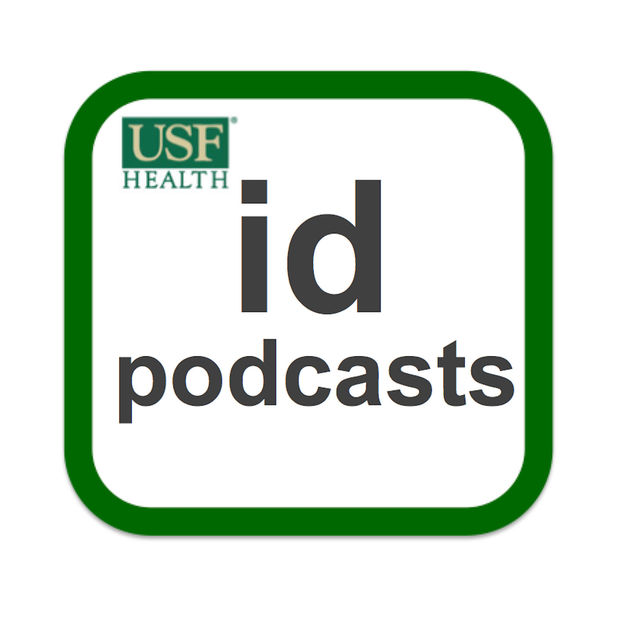
USF Health’s IDPodcasts
IDPodcasts
Enjoy USF Health’s collection of infectious diseases podcasts, featuring educational presentations oriented for healthcare professionals, medical students, residents, and other clinicians. For more information, visit IDPodcasts.net.
- 45 minutesHospital Epidemiology and Infection Control 101
Dr. John Toney, Hospital Epidemiologist and Professor of Medicine at the USF Morsani College of Medicine, presents a basic review of hospital epidemiology and infection control in this presentation. Dr. Toney begins with defining the concept of hospital infection control, and presents a brief historical perspective. Next, he shares a step by step guide to investigating a hospital outbreak, including confirming the outbreak, forming a case definition, making a hypothesis, testing the hypothesis, and placing the plan into action. Dr. Toney then closes with a series of cases meant to reinforce the concepts presented during the first part of the lecture.
30 January 2025, 5:54 pm - 47 minutes 57 secondsBasic Review of the Microbiology Lab for 2025
Dr. Suzanne Silbert, Microbiology Director for Tampa General Hospital, presents this introductory talk on the basics of the microbiology lab for 2025. Dr. Silbert begins with an overview of clinical microbiology, and then reviews the basic classification standards for bacterial organisms, viruses and fungi. She then goes on to discuss culture cultivation techniques, including the use of liquid, solid, or semi-solid media. The speaker then covers identification systems for bacterial organisms, including MALDI-TOF, Disk-Diffusion, and molecular diagnostic techniques.
16 January 2025, 4:21 pm - 49 minutes 40 secondsGram Negative Bacterial Resistance
Dr. Becca Bruning, Infectious Diseases Pharmacy Specialist at the Moffitt Cancer and Research Institute in Tampa, FL, takes a deep dive into the subject of resistance mechanisms for specific gram negative bacteria. Dr. Bruning begins her talk by discussing the primary resistance mechanisms, including porin channels, efflux pumps, and other target sites. Extended spectrum beta-lactamases (ESBLs) are next covered, including typical bacterial species, identification techniques, ESBL testing, and the use of Piperacillin-tazobactam and carbapenems. Next, Dr. Bruning mentions AmpC-type resistance, and identifies the “HECKYES” bacteria. Pharmacokinetic and phamacdynamic considerations are explored, and specific antimicrobial agents are discussed. Lastly, Dr. Bruning covers the use of carbapenemase testing including the modified hodge test and the Carba-R test.
9 January 2025, 8:58 pm - 47 minutes 37 secondsAnaerobic Infections
Dr. Ju Hee Katzman, Infectious Diseases attending and Program Director of the USF ID Fellowship Program, reviews anaerobic infections in this new presentation. In a question and answer format, Dr. Katzman covers the medically significant anaerobic bacteria and categorizes them by their clinical morphology. Next, she covers several clinical scenarios where the treatment of anaerobic infections is indicated, and those in which it is less advisable. Lastly, Dr. Katzman covers specific anaerobic infections, including the Clostridia, the anaerobic gram positive cocci, Bacterioides, Propionibacterium, and Actinomyces.
3 January 2025, 2:08 pm - 51 minutes 35 secondsHIV Dermatology
Dr. Patrick Danaher, Infectious Diseases Clinician at the USF Morsani College of Medicine, discusses the various dermatologic manifestations of HIV in this recorded session. Among the topics discussed includes genital herpes disease, Zoster, Mpox infections, MRSA skin lesions, and Kaposi sarcoma. The lecture is presented in a case-based format.
29 November 2024, 4:59 pm - 55 minutes 49 secondsThe Spirochetes: Leptospirosis and Relapsing Fever
Dr. Richard L. Oehler, Professor of Medicine at the Division of Infectious Diseases, Morsani College of Medicine, reviews two important clinical syndromes caused by Spirochetes. Dr Oehler begins by presenting an actual clinical case of Leptospirosis in a returning traveller from the Caribbean. He then discusses the epidemiology of Leptospira, a widespread zoonotic pathogen that favors temperate and topical climates worldwide. He then relates the life cycle, means of transmission, microbiology, clinical manifestations, and most relevant diagnostic studies. He concludes the leptospirosis section by discussing treatment and prevention. The second case he discusses is a febrile illness in a returning traveler from Jordan. Dr. Oehler goes on to discuss the epidemiology and classification system for relapsing fever (RF), and its broad categorization into tick-borne (endemic) and louse-borne (epidemic) forms. He further describes the characteristics of the soft-shelled Ornithodoros ticks and the Human Body Louse, and differentiates the Hard Tick Relapsing Fevers such as Borellia miyamotoi and B. lonestarii. He then reviews the clinical manifestations, diagnostic criteria, and treatment options for each form of RF. Lastly, Dr, Oehler breaks down treatment and prevention strategies for each form of relapsing fever.
21 November 2024, 11:46 pm - 59 minutes 21 secondsSyphilis: An Epidemic
Dr. Kitan Amin, Infectious Diseases Fellow at the USF Morsani College of Medicine, presents this talk on the current state of syphilis in the U.S. Dr. Amin begins by discussing the epidemiology and classification of Treponemial organisms. The history of Syphilis is then reviewed, including the origins of the disease in the new world and the unfortunate history of the Tuskegee trials. Next, the clinical manifestations of Syphilis are detailed, including primary, secondary, late latent, and neurosyphilis. The unique effects of Syphilis in HIV are also covered. Lastly, syphilis testing and treatment are reviewed, including the effects of the recent Benzathine penicillin shortage and alternatives to Penicillin for treatment.
15 November 2024, 5:48 pm - 22 minutes 15 secondsPneumocystis Pneumonia in Cushings Disease
Dr Cilia Nazef, Infectious diseases Fellow at the University of South Florida Morsani College of Medicine, explores how Pneumocystis jirovecii, a fungal infection typically affecting immunocompromised patients, can also affect patients suffering from hypercortisolism. Dr. Nazef begins by examining different cases of Pneumocystis jirovecii Pneumonia (PJP) in patients with Cushings disease. Next, she further explains the immunologic basis behind how the hypercortisol state induces immunosuppression. Dr. Nazef closes by examining the basis for PJP prophylaxis in Cushings disease patients, and the shortcomings of the current literature in advocating prophylaxis options.
8 November 2024, 1:56 pm - 37 minutes 10 secondsHIV in Older Patients
Dr. Todd Wills, Professor of Medicine with the Morsani College of Medicine at the University of South Florida, reviews the unique complications and issues that can occur in the elderly HIV patient. Dr. Wills begins by reviewing the epidemiology of HIV by age group, including the fact that the HIV positive population is growing older with time. Dr. Wills also discusses issues regarding polypharmacy and medication tolerability in the older patient. Next, the speaker relates how the high prevalence of chronic diseases affect the HIV positive patient’s prognosis. HIV positive elderly patients can suffer not just from frailty, but from cardiovascular disease, diabetes, osteoporosis, and cancer. Dementia can also affect an elderly HIV paitent’s overall wellness and compliance with antiviral therapy. Dr. Wills also covers the assessment of bone density in elderly HIV positive patients. Lastly, Dr. Wills discusses HIV positive patient life expectancy in the modern age of antiretroviral therapy. The lecture is updated for 2024.
29 October 2024, 3:55 pm - 44 minutes 45 secondsGetting to the HAART of HIV Drug Interactions
Dr. Sung Soo Kim, ID clinical pharmacist, presents a talk on the spectrum of HIV therapy and ART (Antiretroviral Therapy)-related adverse drug interactions. Dr. Kim begins by describing the mechanisms by which HIV therapy-related adverse drug interactions occur. Next, he discusses the various classes of antiretrovirals and their specific drug interactions, including integrate inhibitors, NNRTIs, NRTIS, and Protease Inhibitors. Dr. Kim closes by discussing the consequences of unmanaged drug-drug interactions in patients on ARTs as well as the available drug-drug interaction resources available to the clinician.
21 October 2024, 8:31 pm - 1 hour 6 minutesID Management of Hematologic Malignancies and Stem Cell Transplants
Dr. Olga Klinkova covers essential information regarding the management of infectious complications of hematologic malignancies. Topics covered include the initial evaluation of patients, neutropenic fever, neutropenic enterocolitis, and antimicrobial prophylaxis. Next, Dr. Baluch discusses ID management of stem cell transplants, CAR-T therapy, and when it is necessary to administer antimicrobial prophylaxis in these patients. The lecture is updated as of 2024.
7 October 2024, 7:30 pm - More Episodes? Get the App
- http://idpodcasts.net
- en-US
Your feedback is valuable to us. Should you encounter any bugs, glitches, lack of functionality or other problems, please email us on [email protected] or join Moon.FM Telegram Group where you can talk directly to the dev team who are happy to answer any queries.
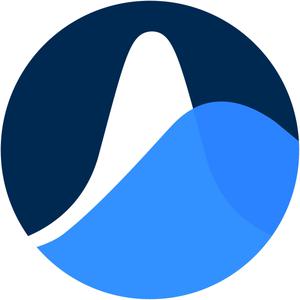 SHEA Podcasts
SHEA Podcasts
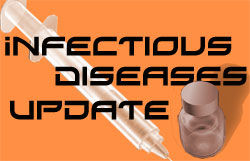 Infectious Disease Update
Infectious Disease Update
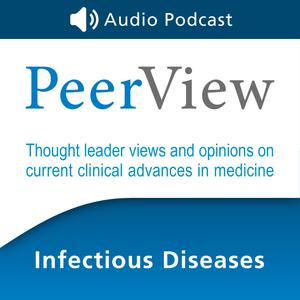 PeerView Infectious Diseases CME/CNE/CPE Audio Podcast
PeerView Infectious Diseases CME/CNE/CPE Audio Podcast
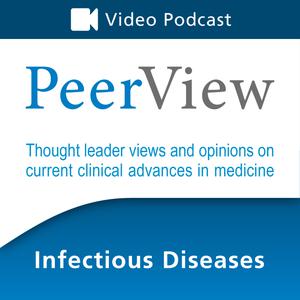 PeerView Infectious Diseases CME/CNE/CPE Video Podcast
PeerView Infectious Diseases CME/CNE/CPE Video Podcast
 A Gobbet o' Pus
A Gobbet o' Pus
 Let's Talk ID
Let's Talk ID